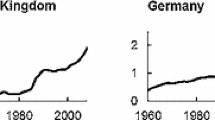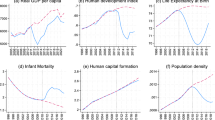Abstract
We present the approach to comparative economic development of Why Nations Fail. Economic prosperity requires inclusive economic institutions—those which create broad based incentives and opportunities in society. Extractive economic institutions, which lack these properties, create poverty. Variation in economic institutions is created by differences in political institutions. Inclusive economic institutions are the result of political choices which arise under inclusive political institutions: a strong state and a broad distribution of power in society. When either of these conditions fails one has extractive political institutions that lead to extractive economic institutions. We relate our analysis to Tullock’s notion of ‘rent seeking’.




Similar content being viewed by others
Notes
To the extent that this is not true anymore in the U.S. it would be a key sign that institutions were no longer as inclusive as they have been in the past, on which see Bell et al. (2017).
See Lawson and Clark (2010) for a related diagram examining the interaction between ‘economic freedom’ and ‘political freedom’.
References
Acemoglu, D. (2003). Why not a political Coase theorem? Journal of Comparative Economics, 31, 620–652.
Acemoglu, D., Johnson, S., & Robinson, J. A. (2001). The colonial origins of comparative development: An empirical investigation. American Economic Review, 91(5), 1369–1401.
Acemoglu, D., Johnson, S., & Robinson, J. A. (2002). Reversal of fortune: Geography and institutions in the making of the modern world income distribution. Quarterly Journal of Economics, 118, 1231–1294.
Acemoglu, D., Johnson, S., & Robinson, J. A. (2005). The rise of Europe: Atlantic trade, institutional change and economic growth. American Economic Review, 95(3), 546–579.
Acemoglu, D., Moscona, J., & Robinson, J. A. (2016). State capacity and American technology: Evidence from the 19th century. American Economic Review, 106(5), 61–67.
Acemoglu, D., & Robinson, J. A. (2000). Political losers as barriers to economic development. American Economic Review, 90(2), 126–130.
Acemoglu, D., & Robinson, J. A. (2006). Economic backwardness in political perspective. American Political Science Review, 100(1), 115–131.
Acemoglu, D., & Robinson, J. A. (2012). Why Nations Fail. New York: Crown.
Álvarez-Nogal, C., & Prados De La Escosura, L. (2013). The rise and fall of Spain (1270–1850). Economic History Review, 66(1), 1–37.
Bell, A., Chetty, R., Jaravel, X., Petkova, N., & Van Reenen, J. (2017). Who becomes an inventor in America? The importance of exposure to innovation. NBER Working Paper No. 24062.
Brander, J. A. (1992). Comparative economic growth: Evidence and interpretation. Canadian Journal of Economics, 25, 792–818.
Carbonetto, D., et al. (1987). El Perú heterodoxo: un modelo económico. Lima: Instituto Nacional de Planificación.
Feinstein, C. H. (2005). An economic history of South Africa: Conquest, discrimination, and development. New York: Cambridge University Press.
Gordon, R. J. (2017). The rise and fall of American growth. Princeton: Princeton University Press.
Grossman, S. J., & Hart, O. D. (1986). The costs and benefits of ownership: A theory of vertical and lateral integration. Journal of Political Economy, 94(4), 691–719.
Haber, S., Klein, H. S., Maurer, N., & Middlebrook, K. J. (2008). Mexico since 1980. New York: Cambridge University Press.
Hsieh, C., & Klenow, P. J. (2010). Development accounting. American Economic Journal: Macroeconomics, 2, 207–223.
Jha, S. (2015). Financial asset holdings and political attitudes: Evidence from revolutionary England. Quarterly Journal of Economics, 130(3), 1485–1545.
John, R. R. (1995). Spreading the news. Cambridge: Harvard University Press.
Khan, B. Z. (2005). The democratization of invention. New York: Cambridge University Press.
Khan, B. Z., & Sokoloff, K. L. (1990). The democratization of invention during early industrialization: Evidence from the United States, 1790–1846. Journal of Economic History, 50(2), 363–378.
Krueger, A. O. (1974). The political economy of the rent-seeking society. American Economic Review, 64(3), 291–303.
Lane, N. (2017). Manufacturing revolutions—Industrial policy and networks in South Korea. http://nathanlane.info/. Accessed 12 Mar 2019.
Lawson, R. A., & Clark, J. R. (2010). Examining the Hayek–Friedman hypothesis on economic and political freedom. Journal of Economic Behavior & Organization, 74(3), 230–239.
Lewis, I. M. (1961). A pastoral democracy. London: Oxford University Press for the International African Institute.
McLeod, C. (2002). Inventing the industrial revolution: The English patent system, 1660–1800. New York: Cambridge University Press.
Michaels, R. (1915). Political parties: A sociological study of the oligarchical tendencies of modern democracy. New York: Hearst’s International Library Co.
Naughton, B. J. (2018). The Chinese economy: Adaptation and growth. Cambridge: MIT Press.
North, D. C. (1990). Institutions, institutional change and economic performance. New York: Cambridge University Press.
North, D. C., & Thomas, R. P. (1973). The rise of the western world. New York: Cambridge University Press.
North, D. C., Wallis, J. J., & Weingast, B. R. (2009). Violence and social orders. New York: Cambridge University Press.
OECD. (2012). OECD review of telecommunication policy and regulation in Mexico. http://www.oecd.org/sti/broadband/49536828.pdf. Accessed 12 Mar 2019.
Pincus, S. C. A. (2009). 1688: The first modern revolution. New Haven: Yale University Press.
Rodrik, D. (1996). Understanding economic policy reform. Journal of Economic Literature, 34(1), 9–41.
Solow, R. M. (1957). Technical change and the aggregate production function. Review of Economics and Statistics, 39(3), 312–320.
Thompson, E. P. (1975). Whigs and hunters. New York: Pantheon Books.
Tullock, G. (1967). The welfare costs of tariffs, monopolies, and theft. Western Economic Journal, 5(3), 224–32.
Tullock, G. (1975). The transitional gains gap. Bell Journal of Economics, 6(2), 671–678.
Acknowledgements
We thank two anonymous referees and the editor for their comments and suggestions and Alex Carr for her editorial assistance.
Author information
Authors and Affiliations
Corresponding author
Additional information
Publisher's Note
Springer Nature remains neutral with regard to jurisdictional claims in published maps and institutional affiliations.
This paper was written to commemorate the 50th anniversary of Gordon Tullock’s 1967 paper which initiated the concept of “rent seeking”.
Rights and permissions
About this article
Cite this article
Acemoglu, D., Robinson, J.A. Rents and economic development: the perspective of Why Nations Fail. Public Choice 181, 13–28 (2019). https://doi.org/10.1007/s11127-019-00645-z
Received:
Accepted:
Published:
Issue Date:
DOI: https://doi.org/10.1007/s11127-019-00645-z




